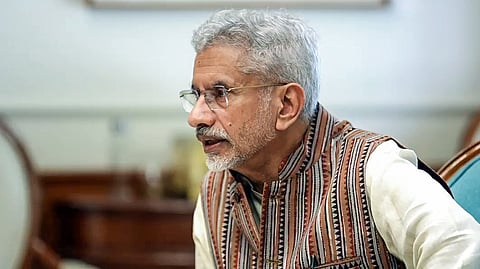

India and Pakistan directly negotiated the cessation of cross-border firing, External Affairs Minister S Jaishankar said on Thursday, adding that New Delhi made it clear to every nation, including the US, that Islamabad had to initiate the call to halt the firing.
Jaishankar made the remarks in an interview with Dutch broadcaster NOS, downplaying US claims of brokering the May 10 ceasefire between India and Pakistan amid rising tensions. The cessation of hostilities followed India’s ‘Operation Sindoor’, launched in retaliation for the April 22 Pahalgam terror attack that killed 26 civilians.
When asked whether the dialogue between the two armies was initiated by the Pakistani side, Jaishankar said, “Yes, we have a mechanism to talk to each other as a hotline. So, on the 10th of May, it was the Pakistani army which sent a message that they were ready to stop firing, and we responded accordingly.”
Regarding the US role in the cessation of hostilities, the minister said US Secretary of State Marco Rubio spoke to him and US Vice President JD Vance contacted Prime Minister Narendra Modi, adding that such communications are natural between nations involved in a conflict.
"Obviously, US Secretary of State Rubio and Vice President Vance had called up, Rubio had spoken to me, Vance had spoken to our Prime Minister, they had their view and they were talking to us and they were talking to Pakistani side as indeed were some other countries. There were some countries in the Gulf, there were some others as well," he said.
"That happens naturally, when we know when two countries are engaged in a conflict, it is natural that the countries in the world call up, sort of indicate their concern and what they can do in such a situation but the cessation of firing and military action was something which was negotiated directly between India and Pakistan," Jaishankar added.
"We made one thing very clear to everybody who spoke to us, not just the United States, but to everyone, saying look if the Pakistani want to stop the firing, they need to tell us, we need to hear it from them, their general has to call our general and say this and that is what happened," he continued.
'Will respond if there is another terror attack'
The EAM also discussed the Modi government’s policy that India will respond to attacks like the April 22 Pahalgam incident.
He said India targeted terrorist sites listed by the United Nations and showed the list to the journalist.
Jaishankar noted that the Pakistani military chose to fire on India following India’s attacks on terror sites, and India responded to their attack. He stated that India’s strikes on Pakistani airbases and air defence systems on May 10 compelled their military to accept that the two nations needed to stop firing on each other.
Outlining India’s approach to counter-terrorism, the EAM said 'Operation Sindoor' is continuing and India will respond if there is another terror attack like the one at Pahalgam, targeting terrorists operating from Pakistan. "What happened was, after the terrorists struck, it was imperative that we have a response because lack of response you understand was impossible in such a situation," he said.
The journalist noted, "It has been tried in the past, not to respond."
Jaishankar replied, "And we have seen the results. So, our government has been very clear. Okay, I accept that may not be the policy of the earlier government. But, our government is very clear, if there is such an attack, there will be response. The response was there, the response targeted these nine places, where the terrorist centres, as I said, they are all, the places are all shown in the UN list, I mean this is where the terrorists work and live and operate from."
Elaborating on India’s response following Pakistani military action, he said, "After that, the Pakistani military chose to fire on us and we responded, this went on four days and after that, the decisive day was the 10th of May. On the morning of 10th May, in response to an attack which they had launched on us earlier that morning, we had hit eight airbases. We basically made these bases non-functional, you know, we hit their runways, we hit their command centres."
"This is the kind of, you hit a runway, you make the airbase non-operational or you went after what is an air-defence command control system, this is the airbase close to Rawalpindi. That I think compelled the Pakistani military to accept that we need to stop firing at each other. At the moment, there is no firing and there has been some repositioning of forces accordingly," he told NOS.
‘Will hit terrorists where they are’
He asserted that 'Operation Sindoor' continues as there is a clear message that India will respond if it faces a Pahalgam-like attack.
"The operation continues because there is a clear message in that operation, that if there are acts of the kind we saw on April 22, there will be a response, we will hit the terrorists. If the terrorists are in Pakistan, we will hit them where they are," Jaishankar told NOS.
"So, there is a message in continuing the operation. But, continuing the operation is not the same as firing on each other. Right now, there is agreed cessation of firing and military action," he added.
Tensions between India and Pakistan escalated after a terrorist attack in Jammu and Kashmir’s Pahalgam killed 26 people and injured several others. In response, India launched Operation Sindoor on May 7, targeting nine terror sites in Pakistan and Pakistan-occupied Jammu and Kashmir (PoJK), killing over 100 terrorists linked to groups like Jaish-e-Mohammed (JeM), Lashkar-e-Taiba (LeT) and Hizbul Mujahideen (HM).
Pakistan retaliated with cross-border shelling along the Line of Control and drone attacks near the border. India responded with coordinated strikes damaging radar infrastructure, communication centres, and airfields at Pakistani airbases. On May 10, both countries agreed to cease hostilities.